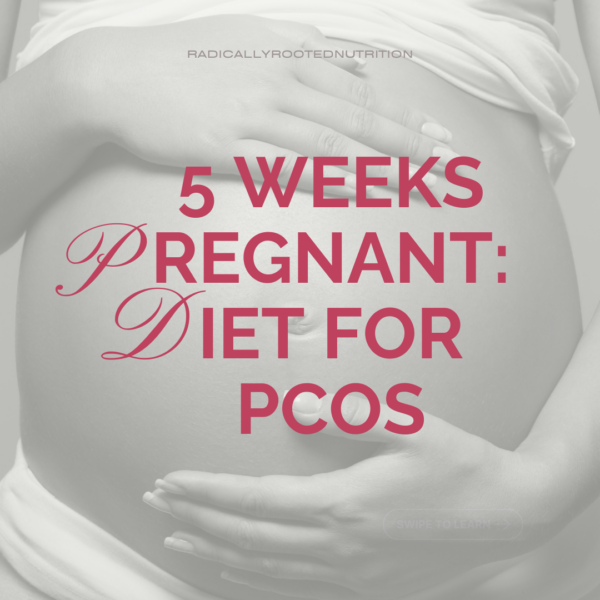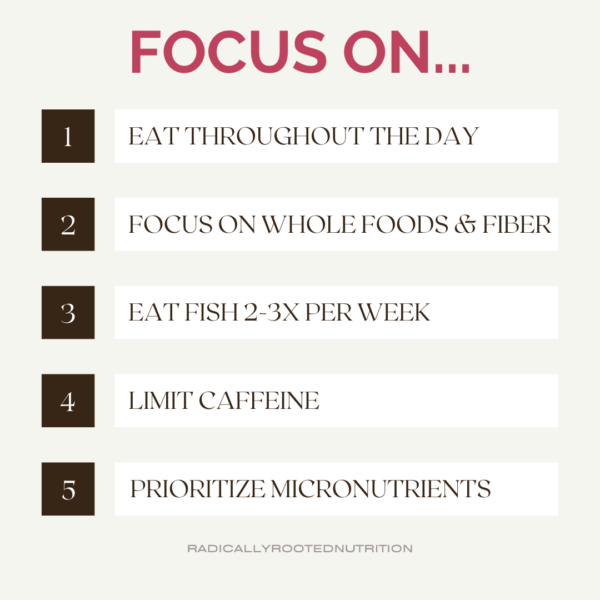Pregnancy Diet for PCOS
When you are 5 weeks pregnant with polycystic ovarian syndrome (PCOS), it is crucial to focus on a balanced diet that supports both pregnancy and the management of PCOS symptoms. PCOS is a condition that affects between 6 to 15 percent of women of childbearing age. Many women with PCOS struggle with weight. For pregnant women, PCOS brings an increased risk of complications for both the mother and her new baby.
Here is the best pregnancy diet for PCOS for healthy pregnancy outcomes….

Eat Regularly Throughout the Day
Nutrition tip number one for a healthy PCOS pregnancy: Eat often throughout the day. Generally aim to eat every three to four hours, including three meals and two or three snacks to help keep blood sugar levels stable. Eating regularly can help with morning sickness by preventing drops in blood sugar levels. Morning sickness can make eating seem unappealing, but it’s important to eat something to nourish our growing baby. If you’re struggling, keep dry whole-grain cereal or crackers with you at all times (in your pocketbook, desk and beside table) to nibble on as needed.
Focus on Whole Foods and Fiber
Tip number two for a healthy PCOS pregnancy: Emphasize a diet low in fat and high in fiber. Include whole grains, legumes, and nuts to increase fiber intake. Including fiber-rich carbohydrates, healthy fats and protein with each meal and snack is better for blood sugar and ensures you’re getting a variety of nutrients. Fiber is found in plant foods such as vegetables, fruit, whole grains, legumes, nuts and seeds. Sources of healthy fats include olive oil, avocado, nuts, seeds, and oily fish. Healthy Protein-rich foods include lean meat, fish, seafood, beans, lentils, and yogurt.
Here are some examples of meals and snacks:
- Scrambled eggs with whole grain toast and avocado for breakfast
- Cooked salmon with quinoa and sauteed kale for dinner
- Plain Greek yogurt with blueberries or an apple and roasted almonds for a snack.

Enjoy Fish At Least Twice a Week
Aim for at least two to three servings of low-mercury fish and seafood per week. Oily fish especially is an excellent source of DHA, the omega-3 fatty acid that is important for a baby’s brain development. Some of the best options include wild salmon, skipjack (light) tuna, mackerel, and sardines. Options for fish that are safe for pregnancy include:
Anchovy
Black sea bass
Cod
Haddock
Salmon
Canned tuna
Sole
Sardines
Cooked shrimp
Limit Caffeine
While coffee can be good for women with PCOS, it’s important to limit caffeine consumption during pregnancy. Current guidelines recommend 200 milligrams as a safe limit, which is approximately two 6-ounce cups of brewed coffee. Green tea can also be part of an anti-inflammatory diet for PCOS. Although it is lower in caffeine than coffee, high amounts of green tea may interfere with folate (a critical nutrient for neural tube development) so limit to one cup per day during your first trimester.
Micronutrients and Supplements
Prenatal multivitamins – A daily prenatal multivitamin helps to fill in the gaps – it does not replace a nutritious diet. When selecting a prenatal multivitamin, look for a safe formula that is third-party certified (i.e. USP or NSF) and meets 100% or more of the daily value for iron, folate, iodine, vitamin D.
Calcium and Choline– Most multivitamins tend to provide inadequate amounts of calcium (1000mg/day) and choline (450mg/day) for pregnancy. Since calcium and choline are often lacking in prenatal multivitamins, make sure to include foods that are rich in these nutrients. Calcium may reduce the risk of pregnancy-induced hypertension, which includes gestational diabetes and preeclampsia, and choline plays an important role in neural tube and fetal brain development.
Vitamin D– deficiency is common in women with PCOS, and pregnancy further increases the demand for vitamin D. It is essential in pregnancy for both mom and baby. Vitamin D levels are depleted in mothers by the time they give birth. Maternal vitamin D supplementation has been shown to reduce the risk of low birth weight and small-for-gestational-age (SGA) births. One study found women taking 4,000 IU of vitamin D daily had the greatest benefits in preventing babies from being born prematurely and reducing complications in pregnancy. Few foods contain vitamin D so supplementation is necessary.
- Dairy is a common source of calcium, but for those who avoid dairy, alternative calcium sources include canned salmon and sardines, collard greens, bok choy, kale, broccoli, tofu processed with calcium, and fortified non-dairy milks.
- Good sources of choline include egg yolks, chicken breast, edamame (soybeans), canned salmon, cod and shiitake mushrooms.
Inositol– helps improve insulin sensitivity and regulate blood sugar levels, which is crucial for managing gestational diabetes in women with PCOS. This will decrease the risk of complications like pre-term birth, preeclampsia and fetal macrosomia. Inositol helps the body use insulin more effectively, which is beneficial for women with PCOS, and several studies have shown it helps prevent gestational diabetes.
- Foods that contain inositol: fruits, beans, grains, nuts.
- Recommended dose:
- Myo-inositol: 4,000 mg/day taken in two doses
- D-chiro-inositol: 100 mg/day
- Combined: Myo and D-chiro inositol: 2,000 mg/day of myo + 50 mg/day of D-Chiro twice a day
Zinc- Ensure adequate zinc intake, as low zinc levels are associated with hyperinsulinemia and inflammation, which are common in PCOS.
- Recommended dose: 30 MG/day
Selenium– Include selenium-rich foods or supplements due to their anti-inflammatory and antioxidant properties.
- Recommended dose: 50-100MG IF NEEDED
Chromium– A dietary supplement containing chromium may be helpful, as it has been found to improve insulin sensitivity in women with PCOS.
- Recommended dose:200-1000MCG
Omega-3 Fatty Acids- If you do not eat omega-3-rich seafood regularly, look for a prenatal or additional supplement that provides 200mg or more DHA.
What to Avoid
- Processed Foods: Minimize or avoid animal products and processed foods, which can increase oxidative stress and inflammation.
- High Fructose Consumption: Limit high fructose intake, as it may exacerbate endocrine-related phenotypes in PCOS.
Bottom Line
If you are pregnant and have been diagnosed with PCOS, it is highly recommended to consult with a registered dietitian. We can help create a personalized nutrition plan tailored to your individual needs. This will ensure that you are getting all the necessary nutrients required for a healthy pregnancy and effective management of PCOS.



